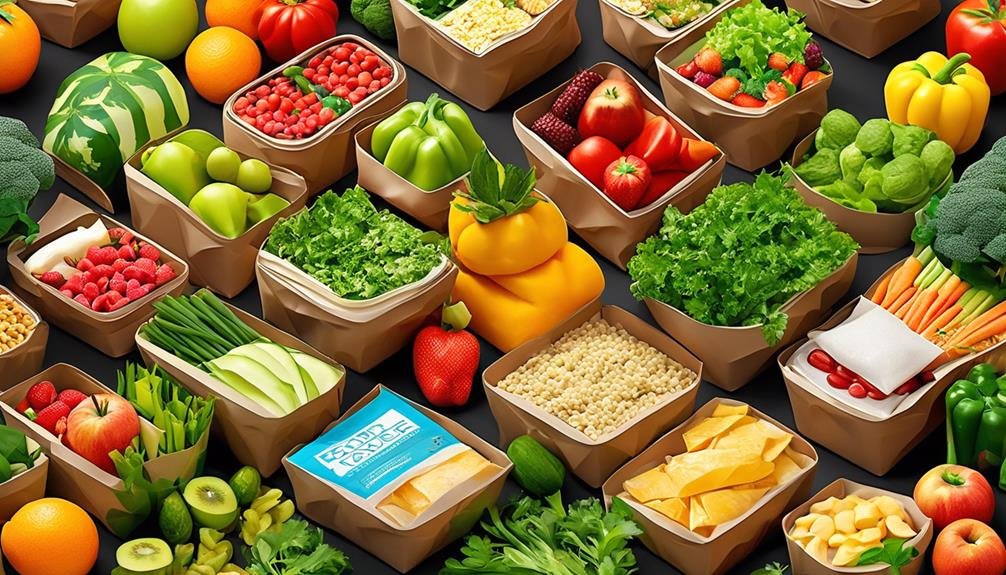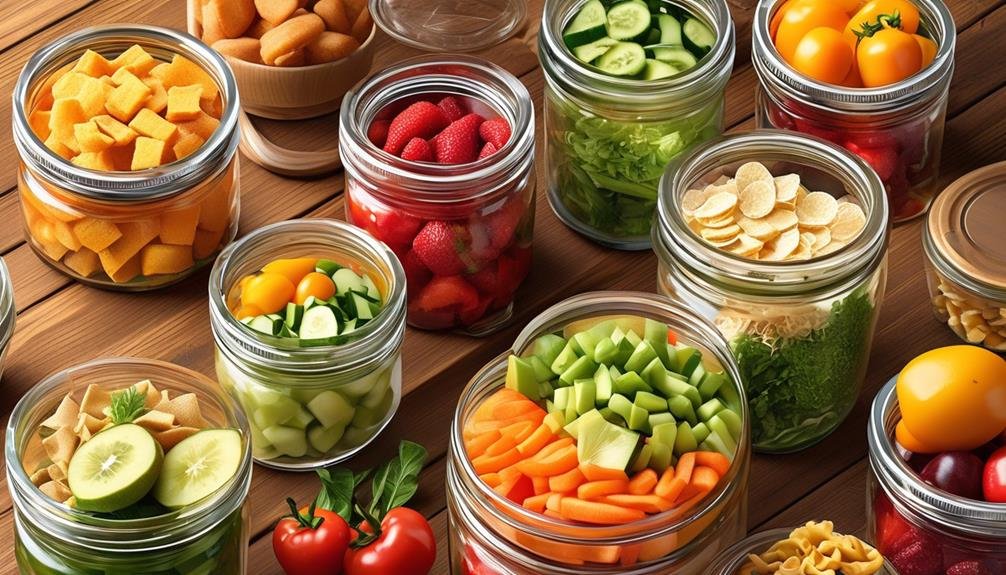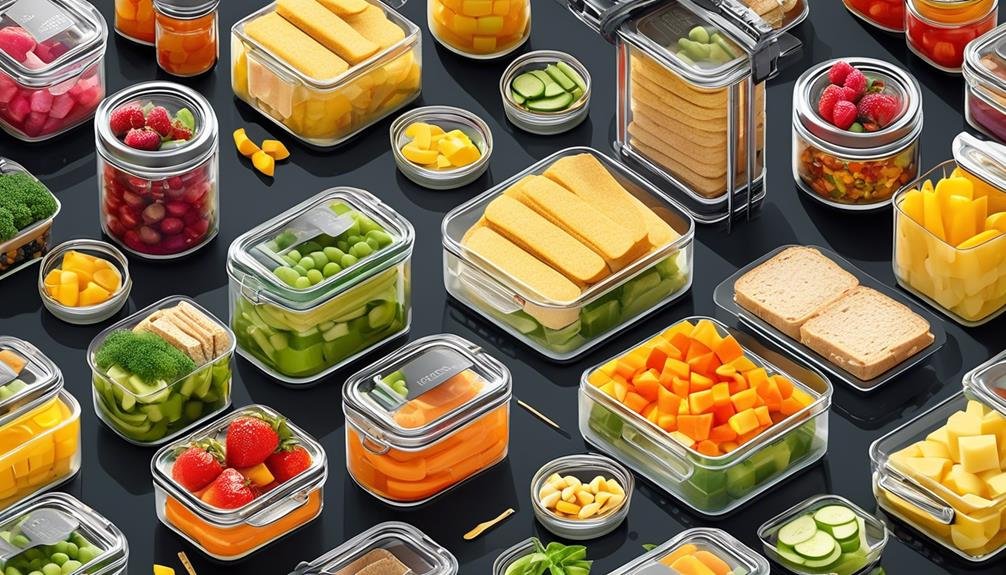By chance, you stumble upon a collection of plastic-free alternatives for food storage and snacks. As you browse through the options, you can't help but wonder what others might prefer.
Are glass containers the top choice, or do people lean towards stainless steel? Perhaps beeswax wraps or reusable silicone bags have caught on. Maybe there's a hidden gem you've yet to discover.
You're left with a burning curiosity, eager to uncover the most favored alternatives out there.
Key Takeaways
- Glass containers are a popular plastic-free alternative for food storage due to their durability, non-toxic nature, and versatility.
- Stainless steel containers offer durability, safety, and easy maintenance, making them a great choice for plastic-free food storage.
- Beeswax wraps provide a sustainable and biodegradable option for replacing plastic wrap, offering a natural and breathable barrier for food.
- Reusable silicone bags and compostable food storage bags are convenient alternatives that are durable, leak-proof, and eco-friendly, reducing plastic waste and carbon footprint.
Glass Containers
When it comes to plastic-free food storage and snacks, glass containers are an excellent alternative. They offer numerous benefits that make them a popular choice for eco-conscious individuals.
Glass containers are durable and long-lasting, reducing the need for constant replacements. They're also non-toxic, ensuring that no harmful chemicals leach into your food.
Unlike plastic containers, glass doesn't retain odors or stains, making it easier to clean and maintain. Additionally, glass containers are microwave and oven-safe, allowing for convenient reheating and cooking.
Their transparency also makes it easy to see the contents inside, eliminating the need to open each container to find what you're looking for.
Furthermore, glass containers are environmentally friendly as they're recyclable and can be reused multiple times. By choosing glass containers, you're making a conscious effort to reduce plastic waste and contribute to a healthier planet.
Stainless Steel Containers
Looking for a durable and eco-friendly alternative to plastic containers? Stainless steel containers are a great option. Not only are they long-lasting and resistant to breakage, but they also offer a range of benefits for both your health and the environment.
Here are some reasons why stainless steel containers are a fantastic choice:
- Durability: Stainless steel containers are built to last. They're resistant to dents, scratches, and rust, ensuring that they'll withstand the test of time.
- Safety: Unlike plastic containers, stainless steel doesn't contain harmful chemicals like BPA or phthalates that can leach into your food. This makes stainless steel a safe choice for storing both hot and cold foods.
- Versatility: Stainless steel containers can be used for a variety of purposes. From storing leftovers and snacks to packing lunches and picnics, these containers are versatile and convenient.
- Easy to clean: Stainless steel is non-porous, making it easy to clean and preventing the growth of bacteria. Simply wash with warm soapy water or toss them in the dishwasher for hassle-free cleaning.
- Eco-friendly: By choosing stainless steel containers, you're reducing your use of plastic and contributing to a more sustainable future. Stainless steel is recyclable, making it an environmentally friendly option.
Make the switch to stainless steel containers and enjoy a safer and greener way to store your food.
Beeswax Wraps
For a sustainable and versatile alternative to plastic wrap, consider using beeswax wraps. Beeswax wraps are made from cotton fabric coated with a mixture of beeswax, tree resin, and jojoba oil. These wraps are reusable, biodegradable, and can be used to wrap various food items, including fruits, vegetables, sandwiches, and cheese.
Beeswax wraps aren't only eco-friendly but also provide a natural, breathable barrier for your food. The beeswax and tree resin create a seal that helps keep your food fresh and prevents it from drying out. Additionally, the wraps are pliable and can easily be molded to fit around different shapes and sizes of food, providing a secure wrap that stays in place.
To use beeswax wraps, simply warm them with your hands to soften the wax, and then wrap them around your food or container. The heat from your hands helps the wraps adhere to themselves and create a seal. After use, rinse them with cold water and mild soap, air dry, and they're ready to be used again.
Reusable Silicone Bags
If you're searching for another plastic-free option for food storage, consider using reusable silicone bags. These bags are a great alternative to single-use plastic bags and can help reduce your environmental impact.
Here are some reasons why reusable silicone bags are a smart choice:
- Versatility: Reusable silicone bags are available in various sizes and shapes, making them suitable for storing snacks, sandwiches, fruits, and even liquids. You can use them in the freezer, microwave, and dishwasher, making them convenient for everyday use.
- Durability: Unlike plastic bags that can tear or break easily, silicone bags are made to last. They're durable and resistant to heat, cold, and general wear and tear. This means you can reuse them over and over again, reducing waste and saving money in the long run.
- Leak-proof: Silicone bags are designed to be leak-proof, which means you can confidently store liquids without worrying about spills or messes. This makes them ideal for packing lunches or storing leftovers.
- Easy to clean: Cleaning reusable silicone bags is a breeze. Most bags are dishwasher safe, but you can also wash them by hand with warm soapy water. They dry quickly and are ready to be used again in no time.
- Eco-friendly: By choosing reusable silicone bags, you're making a positive impact on the environment. These bags are made from a non-toxic material that's free from harmful chemicals like BPA. They're also recyclable, so even when they reach the end of their lifespan, they can be repurposed.
Compostable Food Storage Bags

Consider compostable food storage bags as an eco-friendly alternative for storing your food. These bags are made from renewable resources and break down into organic matter, making them a sustainable choice for reducing plastic waste. Not only do they help protect the environment, but they also keep your food fresh and safe.
| Advantages | Disadvantages | |
|---|---|---|
| 1. | Made from renewable resources like cornstarch or plant fibers | Can be more expensive than traditional plastic bags |
| 2. | Break down into organic matter when composted | Limited availability in some areas |
| 3. | Reduce plastic waste and carbon footprint | May not be as durable as plastic bags |
| 4. | Safe for storing food and microwaveable | Not suitable for long-term storage or freezing |
| 5. | Come in various sizes and shapes for different food storage needs | Require proper composting facilities for full environmental benefits |
When using compostable food storage bags, it's important to remember that they are designed for single-use and may not be as durable as traditional plastic bags. Additionally, they are not suitable for long-term storage or freezing. However, their advantages, such as being made from renewable resources and breaking down into organic matter, make them a great choice for reducing plastic waste and minimizing your carbon footprint.
Stainless Steel Lunchboxes
Stainless steel lunchboxes offer a durable and eco-friendly solution for storing and transporting your meals. Here's why they're a great choice:
- Durability: Stainless steel lunchboxes are built to last. They can withstand daily use and are resistant to dents and scratches, ensuring that your lunchbox will stay in good condition for years to come.
- Eco-friendly: Unlike plastic lunchboxes, stainless steel lunchboxes are free from harmful chemicals like BPA and phthalates. They're also recyclable, making them a sustainable choice for the environment.
- Versatility: Stainless steel lunchboxes are versatile and can be used to store a variety of foods. From sandwiches and salads to leftovers and snacks, you can pack a wide range of meals in these lunchboxes.
- Easy to clean: Stainless steel lunchboxes are easy to clean and maintain. Most lunchboxes are dishwasher safe, saving you time and effort in the kitchen.
- Insulation: Some stainless steel lunchboxes come with insulation properties, keeping your food warm or cold for longer periods. This is especially useful if you want to enjoy a hot meal or keep your snacks chilled throughout the day.
- Stylish design: Stainless steel lunchboxes come in a variety of designs and colors, allowing you to express your personal style while enjoying the benefits of a plastic-free alternative.
Make the switch to stainless steel lunchboxes and enjoy a more sustainable and eco-friendly way to store and transport your meals.
Mason Jars

When it comes to finding a plastic-free alternative for food storage and snacks, mason jars are a versatile and sustainable option. These jars, typically made of glass, provide a safe and eco-friendly way to store your food. Not only are they reusable, but they're also durable and can withstand high temperatures, making them ideal for both hot and cold foods.
The airtight seal of mason jars helps to keep your food fresh and prevents any leakage. They're available in various sizes, allowing you to store different quantities of food depending on your needs. Whether you want to store leftovers, pack a salad, or organize your pantry, mason jars can accommodate all your storage needs.
Moreover, mason jars aren't limited to just food storage. They can also be used as a container for your snacks. Simply fill the jar with your favorite nuts, dried fruits, or homemade granola, and you have a portable and plastic-free snack option. The glass material of the mason jar ensures that your snacks stay fresh and free from any harmful chemicals that can leach from plastic containers.
Frequently Asked Questions
Are Glass Containers Microwave-Safe?
Glass containers are microwave-safe as long as they don't have any metal parts or lids with metal components. It's important to check for any warnings or instructions from the manufacturer before using them in the microwave.
Can Stainless Steel Containers Be Used for Both Hot and Cold Food?
Yes, stainless steel containers can be used for both hot and cold food. They are versatile, durable, and a great plastic-free alternative for food storage.
How Long Do Beeswax Wraps Last Before They Need to Be Replaced?
Beeswax wraps typically last for about a year with proper care. When they begin to lose their stickiness or become worn out, it's time to replace them. They are a great plastic-free alternative for food storage and snacks.
Are Reusable Silicone Bags Leak-Proof?
Reusable silicone bags are a great plastic-free alternative for food storage and snacks. They are leak-proof and can be used over and over again, reducing waste and helping the environment. Plus, they are versatile and easy to clean.
Are Compostable Food Storage Bags Freezer-Safe?
Compostable food storage bags are freezer-safe, making them a convenient and eco-friendly option for storing your snacks and meals. They are designed to break down naturally, reducing plastic waste and helping the environment.
Conclusion
In conclusion, there are plenty of plastic-free alternatives for food storage and snacks that are both practical and sustainable.
Glass containers and stainless steel containers offer a durable and long-lasting option, while beeswax wraps provide a natural and reusable alternative.
Reusable silicone bags and compostable food storage bags are convenient and eco-friendly choices.
Stainless steel lunchboxes and mason jars are also great options for keeping your food fresh without the need for plastic.
By making these simple switches, we can reduce our reliance on plastic and contribute to a healthier planet.






